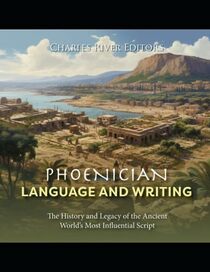Bless Charles Rivers Editors for the lavish use of maps in their eBooks. Other history publishers I read are stingy with maps, which is problematic because those maps explain so much. Often, they are the difference between getting a point and not understanding the complexities of a subject. Plus, Americans are abysmal at geography (and need all the help they can get). I found this story of only average interest. However, adding the critical maps encouraged me to up the score.
The Phonecians were wonderful city-state builders because they actively explored and traded along Africa's coasts and the entire Mediterranean. The Phonecians originally came from the Levant region but soon realized that there was much money to be earned as traveling traders. The Phonecians shared their writing with the Greeks and later the Romans. Each culture changed the writing to meet their needs.
This eBook is more updated than many I've read because (up until recently) historians were unsure where Phonecians came from. This book is more authoritative, stating that Phonecian wasn't studied until 1860. Napoleon III sent soldiers into the Levant to punish the Islamic Druze sect. Like his namesake (Napoleon of 1799), he sent French scholars to study ruins.
The most important three cities of the Phonecians were Byblos, Tyre, and Sidon. Unfortunately, all three cities still exist and have been rebuilt repeatedly. This destroys the possibility of studying the cities easily.
The Phonecians were wonderful city-state builders because they actively explored and traded along Africa's coasts and the entire Mediterranean. The Phonecians originally came from the Levant region but soon realized that there was much money to be earned as traveling traders. The Phonecians shared their writing with the Greeks and later the Romans. Each culture changed the writing to meet their needs.
This eBook is more updated than many I've read because (up until recently) historians were unsure where Phonecians came from. This book is more authoritative, stating that Phonecian wasn't studied until 1860. Napoleon III sent soldiers into the Levant to punish the Islamic Druze sect. Like his namesake (Napoleon of 1799), he sent French scholars to study ruins.
The most important three cities of the Phonecians were Byblos, Tyre, and Sidon. Unfortunately, all three cities still exist and have been rebuilt repeatedly. This destroys the possibility of studying the cities easily.




